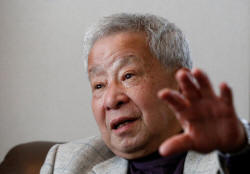|
Japan's Mr Yen says
dollar could fall below 100 yen by end-2017
 Send a link to a friend
Send a link to a friend
 [February 06, 2017]
By Tetsushi Kajimoto and Yoshifumi Takemoto [February 06, 2017]
By Tetsushi Kajimoto and Yoshifumi Takemoto
TOKYO (Reuters) - Japan's former currency czar Eisuke Sakakibara said
the dollar could fall below 100 yen by year-end on U.S. President Donald
Trump's perceived support for a weak dollar, but cautioned that any
yen-selling intervention by Tokyo might be counterproductive.
Sakakibara, who was known as "Mr Yen" in the 1990s when he actively led
currency intervention to stem a strong yen, said Tokyo should avoid
intervention even if yen rises are rapid as doing so would not be
supported by the United States.
Sakakibara, now a professor at Aoyama Gakuin University, told Reuters in
an interview on Monday that gradual yen gains will be beneficial for
Japanese firms with production bases overseas.
Trump's U.S. election victory in November initially brought benefits to
Japan as dollar gains fueled by hopes for his stimulus policies weakened
the yen in a boon to its exports.
But his recent criticism against a weak yen has cast him into one of the
biggest risks to Japan's export-reliant economy, with the dollar hitting
a two-month low of 112.08 yen last week.

Trade and currency policy are likely to be high on the agenda during the
summit between Prime Minister Shinzo Abe and Trump later this week. The
president has criticized the lack of access to the Japanese auto market
for U.S. producers and said Tokyo is using monetary policy to devalue
its currency.
"Trump attaches great importance to domestic employment, which means
that he needs to boost exports. In order to do so Trump is leaning to a
weak dollar policy by, for example, criticizing Japan for adopting weak
yen policy," Sakakibara said.
Trump's perceived weak dollar policy will help drive down the U.S.
currency and possibly spur expectations of slower Federal Reserve rate
hikes and an end to the Bank of Japan's aggressive monetary stimulus, he
said.
[to top of second column] |

Japan's former currency czar Eisuke Sakakibara speaks at an
interview with Reuters in Tokyo, Japan February 6, 2017. REUTERS/Kim
Kyung-Hoon

Last
year, the dollar fell to as low as 99 yen on Brexit fears, but it rebounded to
above 118 yen after Trump's election - close to around 120 yen seen at the start
of the year. It was fetching 112.70 yen on Monday.
JAPAN-U.S. SUMMIT
At this week's summit, Sakakibara said Abe must firmly convey that Japan does
not use monetary policy to target exchange rate, adding Tokyo need not
compromise on trade issues.
It's "impossible" to resolve trade imbalances through currencies, said
Sakakibara, who represented Japan as a member of bilateral forum on insurance
sector negotiations in the 1990s.
"These are old-yet-new issues, which have never been resolved," he said,
referring to Japan-U.S. trade issues.
"We revalued the yen a lot through the (1985) Plaza Accord, assuming that would
decrease Japan's exports, but our trade surplus and U.S. deficits have persisted
despite the dollar's weakening," Sakakibara said.
"Experiences showed that trade imbalances have not been resolved by adjusting
currency rates."
(Reporting by Tetsushi Kajimoto; Editing by Shri Navaratnam)
[© 2017 Thomson Reuters. All rights
reserved.] Copyright 2017 Reuters. All rights reserved. This material may not be published,
broadcast, rewritten or redistributed.

|